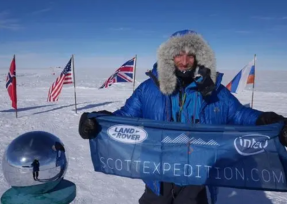
Meet Ben Saunders: adventurer, athlete, motivational speaker. Ben, at the age of 23, was the youngest man to ski solo (单人滑雪) to the North Pole. He dragged a 180-kilogramme sledge (雪橇) over 1,420 miles through the worst Arctic conditions. This year, as well as planning a return to the Arctic, Ben plans to ski solo from the Antarctic coast to the South Pole and back in the autumn, carrying all his supplies on his sledge.
Ben Saunders was fired after persuading the firm to support his disorganized first adventure. “Everything that could go wrong did go wrong. We were attacked by a bear. We started running out of food. It was just desperate. And we didn't get to the Pole; we didn't get there, so we had no media interest. No one heard about it: no book deal, and no speaking. I was so unhappy.”
People said it was impossible for me to get to the Pole. I said, “No, I can get there,” and I did. Self-belief, I see it as being a bit like a muscle — it's my belief that the more you stretch (伸展) yourself the stronger it gets. If you never do anything that's uncomfortable or risky then your self-belief gets weaker. So that's one of the lessons I've figured out along the way. The thing that I've stretched and tested is my self-belief.
“My Antarctic adventure is just practicable and that's what is exciting to me. If I knew it was possible, if I knew I could do it without too much bother, I wouldn't be interested.” Why? “Personally I'm attracted by the human performance element to it. Not that long ago, running a marathon was seen as the top point of human attempt, and now I wouldn't be that surprised if my mum said she was going to run one next year.”
People's horizons (见识) are changing. “I'm not particularly gifted, and I'm absolutely average. I've just chosen this one goal to achieve and I've been working hard to realize it. That's it. And that's the thing that attracts me: with enough training and enough determination, enough focus and preparation, how far can we go? And I don't think I've found out yet.”
【小题1】What do we know about Ben Saunders' first adventure?| A.There was no press coverage. |
| B.It was supported by his company. |
| C.It was well planned and organized. |
| D.He actually reached the North Pole. |
| A.often test your confidence | B.try something adventurous |
| C.aim to reach the North Pole | D.always stretch your muscles |
| A.he liked running a marathon |
| B.he wanted to exercise his body |
| C.he knew it might be achievable |
| D.he was sure he could do it easily |
| A.We have to change our views about adventure. |
| B.We can never know our possibilities and energies. |
| C.We should have a reason for going on an adventure. |
| D.We have to be especially talented to have an adventure. |


